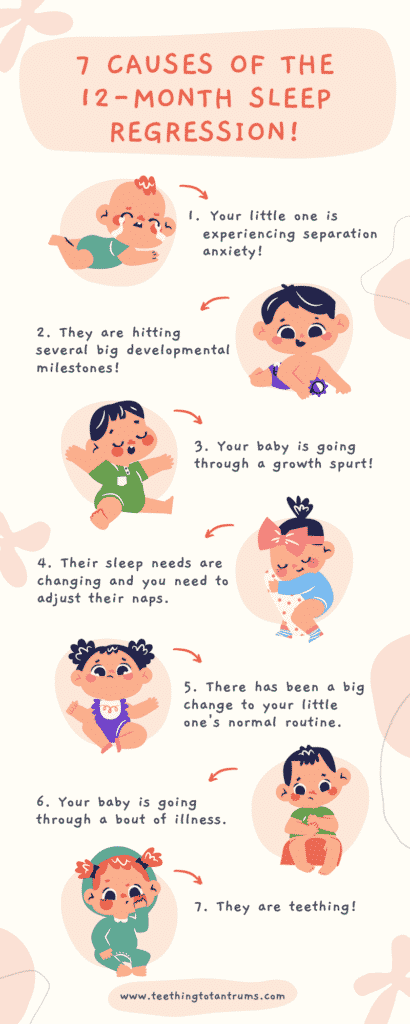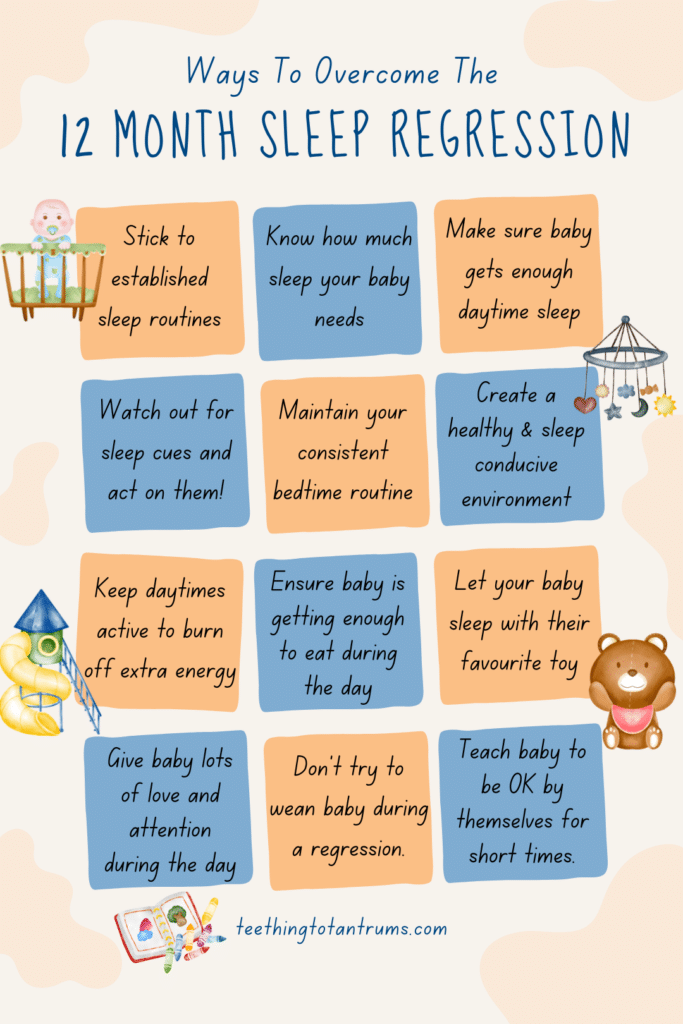Are you a sleep-deprived parent struggling to cope with your baby’s 12 month sleep regression? Or perhaps you’re a proactive parent determined to avoid this common sleep disruption at all costs? Either way, you’re in the right place.
In this article, I’ll explain what a 12-month sleep regression is, why it happens, and most importantly, what you can do to help your little one get the rest they need. With my expert advice and unwavering support, you’ll be equipped to tackle this challenging time head-on and emerge victorious. So settle in, grab a cup of coffee, and let’s get started.
What Is A 12 Month Sleep Regression?
A 12 month sleep regression is when your baby’s established sleep schedule is disrupted around their first birthday. It usually coincides with reaching big milestones such as learning to cruise, taking their first steps or saying their first words. It can also be triggered by baby’s growing awareness and desire to be with you all the time.
How Long Does The 12 Month Sleep Regression Last?
A 12 month sleep regression usually lasts between 5 days and a few weeks. The most important thing to remember when your baby is going through a sleep regression is: it is just a phase and will not last forever.
Do All Babies Go Through A 12 Month Sleep Regression?
No. Not all babies will experience a 12 month sleep regression. It will depend on the personality of your baby, what is going on in their development and what is happening in their environment.
12-Month Sleep Regression Signs
If your little one has been settling and sleeping well until now, the signs that your baby is experiencing a sleep regression are:
- Resisting bedtime
- Fussiness around bedtime
- Distruped sleep cycles
- Restlessness and more frequent night waking
- Struggling to get back to sleep after nighttime waking
- Sleeping for longer in the day
Looking to get your little one to sleep quickly and effortlessly? Check out my Bedtime and Nap Cheat Sheet and master the art of making daytime naps and bedtimes as seamless as possible.
A bedtime & nap cheat sheet so good your little one will ask you to put them to bed...
Laura Williams "This is a life saver! I'm so glad I downloaded your bedtime & nap cheat sheet. My little one actually asked me to put him to bed last night! Unbelievable! Thank you so much!"
Click Here For The FREE Cheat Sheet
Causes Of The 12 Month Sleep Regression
Of course, as I mentioned earlier, sleep regressions can be caused by a variety of reasons, the main one being developmental leaps… However, there are other reasons why a 12 month sleep regression can occur and it’s important to know what they are to reduce the chances of a sleep regression from occurring.

1. Separation Anxiety
Many babies experience separation anxiety as they become more emotionally developed. This can happen at any point from about 8 months up and is perfectly normal.
Separation anxiety will result in your baby being less able to settle at nap times and bedtime and when they wake up, they will find it difficult to go back to sleep without you with them.
As with all sleep regressions, you need to be consistent. Maintain as much structure as you can to your nighttime routines, implement the above suggestions and be patient… Things will settle back down soon.
2. Developmental Milestone Leaps
Again, at 12 months, your baby is having a very busy time developmentally. As their physical, cognitive and emotional development is advancing, their little brains are very busy learning new words and figuring out how to walk.
This can result in them finding it difficult to settle to sleep due to overtiredness and excitement to continue to practise. Watching out for sleep cues and ensuring your baby is getting enough nap time can help a lot when dealing with all this mental and physical development.
3. Growth Spurts
When a baby experiences a growth spurt, it may temporarily upset their sleep patterns due to the fact they are hungrier during this time. Therefore, your baby may require more solid food during the day to sustain them through the night.
If you do not do this, your baby will wake at night hungry and agitated.
I would not advise feeding your baby any more at night than they would normally get… but rather aim to feed them more during the day to reduce the impact of wanting more nighttime feeds.
After all, you’ve worked so hard to begin weaning them off nighttime feeds… You don’t want them to get used to it again.
4. Changes In Sleep Needs
Some 12-month-olds will start to fight sleep during the day as they need to drop from 2 naps to 1. Others will become more tired as they get used to being more physically active and need more sleep during the day so they won’t drop the second nap until they are 14 months old or older.
Both of these factors can disrupt your baby’s sleep and getting the balance right during this transition can be tricky as your baby may become overtired and this can lead to difficulty in falling asleep and subsequently to more night-time waking.
Here’s a quick video to go over why babies fight sleep and I’ve written an in-depth article about nap transitions so be sure to check that out to learn more.
5. Changes In Their Normal Routine
Just like many of us, having a major change in routine or location may disrupt your little one’s established healthy sleep habits. This could be from moving house, going on holiday or having a family member move in to name a few.
6. Illness
A 12 month sleep regression can also be triggered by illness. So if your baby has been unwell and you have had to attend to them more at night, once they’re better they may wish for the nighttime contact with you to continue.
Of course, love and support your baby through this bout of illness but once they’re feeling well again, it is REALLY important to get back into your usual sleep routine as soon as possible.
7. 12 Month Sleep Regression Or Teething?
If your little one is teething, then this will also disrupt their sleep patterns for a few days but it is NOT technically a sleep regression. Teething sleep issues arise from your baby being uncomfortable and wanting some love.
However, once the offending tooth has emerged, your little one should go back into their regular sleep routine very quickly.
So, for now, choose some soothing teething toys and offer teething foods to help your baby distract and massage their gums until this painful time is over.
How To Overcome The 1 Year Sleep Regression
If your little one does start to experience sleep troubles around their first birthday, then there are some things you can do to help both you and your baby get through the 1 year sleep regression:

1. Stick To Established Sleep Routines
If your baby is experiencing a 12 month sleep regression, it is very important that you continue to follow your established bedtime routines and nap-time sleep schedule.
Don’t be tempted to pick your baby up more or go back to rocking them to sleep if you have not been doing this before. Otherwise, you run the risk of establishing bad habits that will be hard to undo.
2. Know How Much Sleep Your 12-Month-Old Needs
In order to help your baby through a 12 month sleep regression, it is helpful to know how much sleep they should be having. The average 12-month-old needs 13-15 hours of sleep per day with 2-3 hours of that taken in daytime naps (depending on how long they sleep at night).
3. Make Sure Your Baby Has Age-Appropriate Naps
Most babies of this age usually still need a morning nap and an afternoon nap, but some will be showing signs of transitioning from two naps down to one nap and this can be quite tricky to judge.
The transitioning period itself may be the cause of the 12 month sleep regression, so getting daytime naps right is a bit of a balancing act to prevent your little one from becoming overtired.
4. Watch For Sleep Cues
When it comes to dealing with nap transition, spotting your little one’s sleep cues is key to helping get through a 12 month sleep regression.
Sleep cues include:
- Clinginess
- Lack of interest in food
- Grizzling and whining
- Lack of focus and patience when playing with toys
- Wanting a lot of attention
5. Have A Consistent Bedtime Routine
Toddlers of this age should be going to bed between 6.30pm and 7.30pm. Having an established bedtime routine before a 12 month sleep regression hits will make it easier to deal with as you will have a solid base to work from.
REMEMBER: You may find some toddlers need an earlier bedtime to avoid they getting overtired after a busy day.
6. Create A Healthy Sleep Environment
Ensuring your baby’s bedroom is conducive to sleep is also vital. Make sure there is not too much light, that the room is at the right temperature and it might help to use a white noise machine to keep a consistent gentle background noise.
Some babies may like some light in their room, in which case I would definitely use a soft nightlight like this one from LICKLIP:
Finding the right night light for your child can be quite a task. You want something safe, comforting, and practical. The Cozy Starry Night Light ticks these boxes, with eye-friendly warm lighting and an easy-to-use dimmer.
Its gentle glow makes it the best night light for feeding baby, diaper changes, or comforting your little one back to sleep.
As your baby grows the Cozy Starry Night Light's starry sky projection can provide comfort and gentle quiet time stimulation. Its soft lighting ensures a dreamy, peaceful environment, supporting your baby’s natural sleep cycle.
It really is a fantastic nightlight (at a very reasonable price!)
- Eye-friendly warm lighting with adjustable brightness.
- Includes a timer function for convenience.
- Projects a starry sky that is soothing for little ones.
- Rechargeable battery, so it's very portable.
- A USB adapter is not included for charging.
- The star projector is static without motion (however, this is ideal for very young babies and toddlers).
- Battery life varies based on the brightness settings.
7. Keep Day Times Active
This is a time in your baby’s life when they become increasingly active. So make sure they get plenty of opportunities to use all that energy by cruising around furniture, getting outdoors every day and maybe even walking.
Making your home child-proof, where they can explore safely, will make your life a lot easier too.
8. Make Sure Your Little One Is Getting Enough To Eat During The Day
At twelve months of age, your baby is capable of going all night without needing a feed so do not be tempted to feed your baby when they wake up in order to resettle them.
Rather, make sure they are having enough calories during the day to fuel any growth spurt and extra activities they might be doing.
Ideally, they will need between 800 and 1000 calories per day from a mixture of milk and food (if you’ve started weaning).
9. Let Your Baby Sleep With A Favourite Toy
Putting a favourite soft toy in bed with your baby may help with separation problems as it may smell of you and be very comforting to them.
Super soft, very cuddly and the perfect companion to young children, the GUND Teddy Bears never fail to be toy box favourites for years to come!
10. Don’t Try To Wean Your Baby Off The Breast Or Bottle
As your baby is dealing with a lot of changes developmentally, I would not recommend trying to wean them off the breast or bottle when they are going through a 12 month sleep regression.
Instead, wait for the regression to pass before beginning weaning.
11. Give Your Baby Lots Of Love, Affection And 1-on-1 Time During The Day
This is a wonderful age when so much is going on in your little one’s life so explore it with them and spend lots of time cuddling and playing together.
This will help your baby to expel their extra energy, help you bond even more, and ensures your baby does not feel like they have been alone all day which could make them crave your attention at night!
12. Help Your Baby Get Used To Spending Short Periods Of Time On Their Own Or Away From You
Encourage your baby to spend short periods of time alone in a playpen or their crib during awake times. But Keep popping back to check on them so that they know that you will return.
This will teach them that they’re safe and ok to be alone and that you will return in time. And as a result, baby will go to sleep alone at night much easier as they understand that you will be back in the morning.
I personally prefer the Graco Play Yard for independent toddler play:
Perfect for families with a young baby, this pack n play comes with a removable bassinet and diaper changing station as well as a spacious and airy playard for your little one to play in as they grow! Designed with style, longevity and baby safety in mind, Graco has created the perfect playroom companion for busy parents.
How Can You Care For Yourself During A Sleep Regression Phase?
Sleep regressions are tough for your baby and equally as tough on you as the parent.
But keep in mind that this is just a transitory temporary phase so don’t be too hard on yourself if you are finding it tough to have consistent routines and nap times.
Just remember to try and take a break if you can, by letting a close family member or friend look after your baby… And if you are feeling very tired, then put your toddler somewhere safe such as a playpen or crib and make yourself a warm beverage to compose yourself for 5 minutes.
Another piece of advice is to try to get out for a walk with your baby in a stroller every day.
As hard as it may feel to do, it will give you a break whilst keeping your little one entertained all while giving them the fresh air they need to help them sleep better. Trust me, even a short walk to the end of the road and back will help you feel so much better and much more human.
Frequently Asked Questions About The 12 Month Sleep Regression
Looking for more help with managing the 12 month sleep regression? Find answers to the most common questions here.
Will Sleep Regressions Ruin Your Sleep Training Plans?
The answer to this question is: no. A sleep regression will not ruin your sleep training methods.
Having a well-established bedtime routine will actually help when dealing with a 12 month sleep regression. So stick to your bedtime routines and do not fall into bad habits when dealing with nighttime waking.
When To Seek Help From A Doctor About A Sleep Regression
There are some occasions when you may feel the need to seek medical advice or a sleep consultant in connection with your toddler experiencing a change in their normal sleep patterns; especially if the disruptions in sleep is associated with any of the following:
- Lack of growth
- Difficulty breathing or snoring when sleeping
- Any major change in eating habits
- Change in bowel movements or frequency of urination.
When Do Sleep Regressions Occur?
Sleep regressions can occur at any age. However, they are more common when your baby is 4 months old, 6 months old or 8 months old, or when your toddler is 12 months old or 18 months old. A regression will usually occur when your baby reaches certain developmental milestones too.
Need More Parenting Help?
- Download our FREE Bedtime & Nap Sleep Cheat Sheet. It’s a free, easy-to-use and proven formula designed for parents of 0-5 year olds to master the art of consistently undisturbed and restful sleep without the yelling, nagging or exhausting long-winded evenings.
- Check out our Parenting Toolbox. You’ll get access to expertly-chosen products that you can guarantee are the best for your little one and your wallet.
- Are you looking for personalized guidance to navigate the challenges of parenting? I offer 1-on-1 consultations to bring you tailored strategies and actionable advice to help support your child's growth and well-being with confidence.

A bedtime & nap cheat sheet so good your little one will ask you to put them to bed...
Laura Williams "This is a life saver! I'm so glad I downloaded your bedtime & nap cheat sheet. My little one actually asked me to put him to bed last night! Unbelievable! Thank you so much!"
Click Here For The FREE Cheat Sheet





